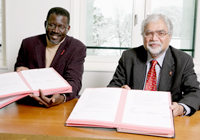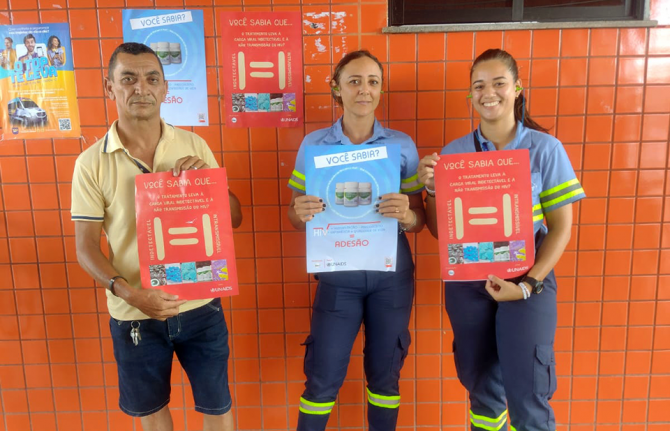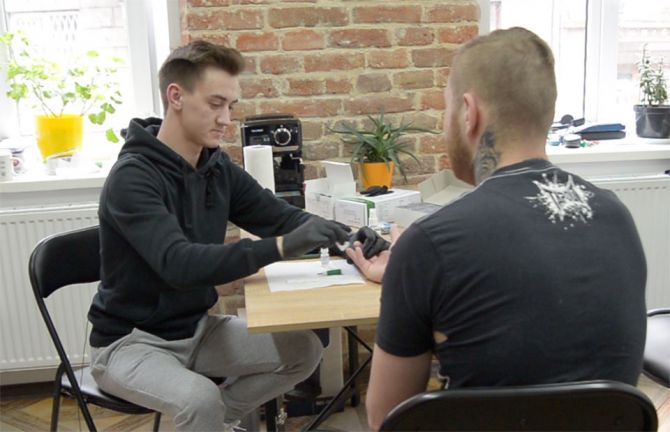
Feature Story
UNAIDS and International Federation of the Red Cross and Red Crescent renew collaboration
11 December 2008
11 December 2008 11 December 2008
(L to R) Elhadj Amadou Sy, UNAIDS Director of Partnerships and External Relations and Dr Mukesh Kapila, Special Representative of the IFRC Secretary General. Credit: UNAIDS/L. Solberg
The International Federation of the Red Cross and Red Crescent (IFRC) and the Joint United Nations Programme on HIV/AIDS (UNAIDS) renewed their collaboration agreement to work together to scale up efforts for universal access to HIV prevention, treatment, care and support services worldwide.
The partnership, covering a three-year period from 1 January 2009 to 31 December 2011, will focus on two main issues. First, it will pay particular attention to addressing stigma and discrimination related to HIV and secondly, it will also aim to maximise HIV prevention, treatment, care and support efforts in situations of humanitarian crisis.
“This agreement brings together the comparative advantages of both organizations to effectively address the challenges of HIV, particularly in the context of humanitarian conflict situations”, said Elhadj As SY, UNAIDS Director Partnerships and External Relations. “Stigma and discrimination are major barriers towards achieving universal access to HIV prevention, treatment, care and support. Strong partnerships with people living with HIV will help us make a difference,” he added.
To attain the objective of bringing down stigma and discrimination, the IFRC will work in partnership with the Global Network of People living with HIV and AIDS (GNP+), the leading organization that advocates to improving the quality of life of all people living with HIV.
The collaboration between IFRC and GNP+ has been instrumental in the preceding UNAIDS agreement of 2004-2006 by addressing HIV related stigma and discrimination through the national Red Cross Red Crescent Societies.

Credit: UNAIDS/L. Solberg
The promotion and protection of human rights, greater involvement of people living with HIV in the response to AIDS, gender equality and the involvement of civil society in national coordinating and decision making bodies are some of the guiding principles that will drive the collaboration.
“People living with HIV are entitled to the full protection of national laws to uphold their human rights, but even that is not enough. Stigma is still killing people at least as much as AIDS, and so the irrational drivers of this fear and lethal exclusion must be better understood and mediated. Social cohesion is the foundation of effective response to HIV,” said Dr Mukesh Kapila, Special Representative of the Secretary General.
About IFRC
The International Federation of Red Cross and Red Crescent Societies is the world's largest humanitarian organization, providing assistance without discrimination as to nationality, race, religious beliefs, class or political opinions. Founded in 1919, the International Federation comprises member National Red Cross and Red Crescent Societies and a Secretariat working from Geneva and strategic locations around the world. The Federation strives, through voluntary action based on the Fundamental Principles of the Red Cross and Red Crescent Movement, for a world of empowered communities, better able to prevent and alleviate human suffering and advance human development.
About UNAIDS
UNAIDS, the Joint United Nations Programme on HIV/AIDS is the main advocate for global action on the epidemic. It brings together the efforts and resources of ten UN system organizations in the AIDS response: UNHCR, UNICEF, WFP, UNDP, UNFPA, UNODC, ILO, UNECSO, WHO and World Bank. It leads, strengthens and supports an expanded global response aimed at preventing transmission of HIV, providing care and support, reducing the vulnerability of individuals and communities to HIV, and alleviating the impact of the epidemic.
UNAIDS and International Federation of the Red Cr
Partners:
International Federation of the Red Cross and Red Crescent (IFRC)
Publications:
A vital partnership: The work of GNP+ and the International Federation of Red Cross and Red Crescent Societies on HIV/AIDS
UNAIDS Best Practice Collection, October 2003 (pdf, 1.17 Mb)



